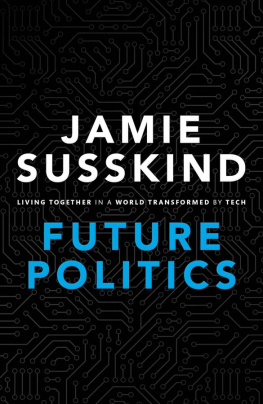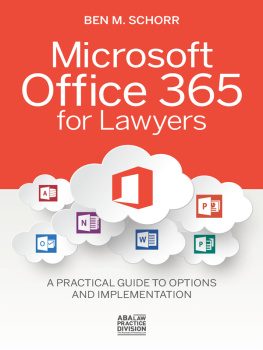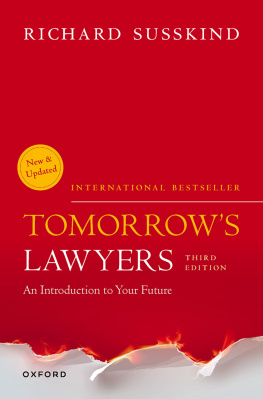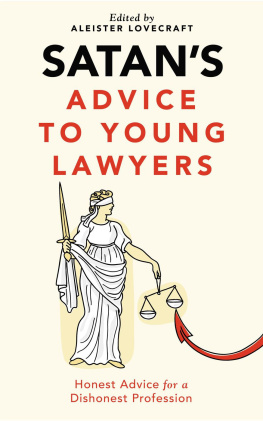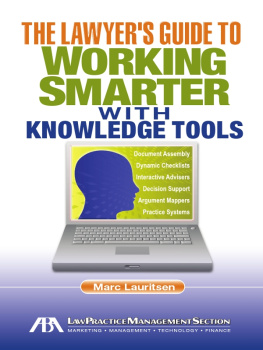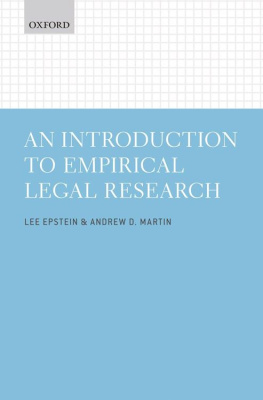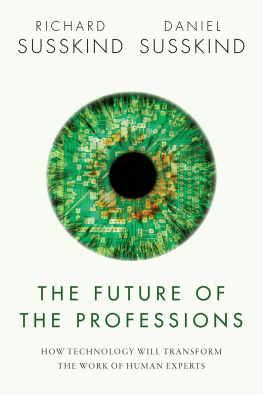Susskind - Tomorrows Lawyers
Here you can read online Susskind - Tomorrows Lawyers full text of the book (entire story) in english for free. Download pdf and epub, get meaning, cover and reviews about this ebook. year: 2013, publisher: OUP Oxford, genre: Business. Description of the work, (preface) as well as reviews are available. Best literature library LitArk.com created for fans of good reading and offers a wide selection of genres:
Romance novel
Science fiction
Adventure
Detective
Science
History
Home and family
Prose
Art
Politics
Computer
Non-fiction
Religion
Business
Children
Humor
Choose a favorite category and find really read worthwhile books. Enjoy immersion in the world of imagination, feel the emotions of the characters or learn something new for yourself, make an fascinating discovery.

Tomorrows Lawyers: summary, description and annotation
We offer to read an annotation, description, summary or preface (depends on what the author of the book "Tomorrows Lawyers" wrote himself). If you haven't found the necessary information about the book — write in the comments, we will try to find it.
Susskind: author's other books
Who wrote Tomorrows Lawyers? Find out the surname, the name of the author of the book and a list of all author's works by series.
Tomorrows Lawyers — read online for free the complete book (whole text) full work
Below is the text of the book, divided by pages. System saving the place of the last page read, allows you to conveniently read the book "Tomorrows Lawyers" online for free, without having to search again every time where you left off. Put a bookmark, and you can go to the page where you finished reading at any time.
Font size:
Interval:
Bookmark:
Praise for Tomorrows Lawyers:
For years, Susskind has challenged lawyers to reinvent the way we work. Now, in Tomorrows Lawyers, he presents his clearest picture yet of what the future has in store.
Hugh Verrier, Chairman, White & Case
A must-read for anyone interested in the future of legal services. Insightful, thought provoking and challenging, Susskind has clearly identified the inexorable forces that will drive change.
David Allgood, Executive Vice President and
General Counsel, Royal Bank of Canada
An invaluable resource for all participants in 21st century law. Susskind provides a uniquely expert, yet readable and succinct, analysis of the profound changes underway in the profession and business of law, including specific predictions of where it all is headed and concrete strategies for achieving rewarding outcomes.
Ralph Baxter, Chairman and CEO, Orrick
One of the legal worlds most respected commentators, Richard Susskind, has amassed further compelling evidence of the need for a legal profession that extends itself beyond traditional service. Tomorrows Lawyers is a must-read not only for those embarking on a legal career - but also acts as a timely reminder to practitioners who wish to stay ahead of the curve.
Robert Gogel, CEO, Integreon
In Tomorrows Lawyers, Richard Susskind has managed to articulate the tremendous change facing the legal profession in a uniquely insightful way. He captures the challenges and opportunities for the lawyer of the future in the most readable form I have come across. This book is required reading for anyone interested in the business of law.
Neville Eisenberg, Managing Partner,
Berwin Leighton Paisner LLP
An Introduction to Your Future
Richard Susskind


Great Clarendon Street, Oxford, OX2 6DP,
United Kingdom
Oxford University Press is a department of the University of Oxford.
It furthers the Universitys objective of excellence in research, scholarship, and education by publishing worldwide. Oxford is a registered trade mark of Oxford University Press in the UK and in certain other countries
Richard Susskind, 2013
The moral rights of the author have been asserted
First published 2013
Impression: 1
All rights reserved. No part of this publication may be reproduced, stored in a retrieval system, or transmitted, in any form or by any means, without the prior permission in writing of Oxford University Press, or as expressly permitted by law, by licence, or under terms agreed with the appropriate reprographics rights organization. Enquiries concerning reproduction outside the scope of the above should be sent to the Rights Department, Oxford University Press, at the address above
You must not circulate this work in any other form and you must impose this same condition on any acquirer
Crown copyright material is reproduced under Class Licence Number C01P0000148 with the permission of OPSI and the Queens Printer for Scotland
British Library Cataloguing in Publication Data
Data available
ISBN 9780199668069
Printed in Great Britain by
Clays Ltd, St Ives plc
Links to third party websites are provided by Oxford in good faith and for information only. Oxford disclaims any responsibility for the materials contained in any third party website referenced in this work.
I dedicate this book to
Daniel, Jamie, and Ali,
my loving children, who bring me endless happiness
I have written this book to provide tomorrows lawyers and legal educators with an accessible account of the pressing issues that currently face the legal profession and the justice system. We are, I have no doubt, on the brink of fundamental change in the world of law, and my main aim is to encourage wider discussion of the forces at play and their likely impact.
Although originally conceived as a guide to the future for the next generation of lawyers, I expect that the book will also be read by more experienced practitioners. For busy professionals who do not have the time to read lengthy texts, I hope that it serves as a punchier version of my ideas than my previous work. Certainly, it represents a substantially updated version of my views on trends in the legal market.
I do not anticipate that readers will agree with all of what I say. But if the book gives rise to more serious reflection and debate about the future of the law and lawyers, then I have done my job. And yet, because we live in such rapidly shifting times, it is a job that is necessarily incomplete. Each day, I hear fresh tales of innovation in lawa new legal business here, an online facility there, and a regular flow of imaginative ideas for meeting clients needs in different ways. In citing these innovations, I had to draw the line somewhere, however, and so I have only been able to refer to developments that surfaced before the end of May 2012. I would not be surprised, by the time this book is published, if some important new legal services have been launched in the interim.
I have some people to thank. First of all, there is the team at Oxford University Press. This is the fifth time that OUP has agreed to take on one of my books and, as ever, it has been a privilege to work with such a well-regarded publishing house. I am especially grateful to Ruth Anderson and Sophie Barham in the UK and to Ninell Silberberg in the US for their friendly support and advice. I must also record my thanks to the various referees who anonymously assessed my book proposal and made a wide range of suggestions that led, I believe, to many significant improvements.
Next is Patricia Cato, who helped me with innumerable initial drafts and still comfortably outperforms any speech recognition system in making sense of my rapid Glaswegian.
I have also benefited greatly from the guidance, encouragement, and criticisms of a small group of friends and colleagues who generously spent many hours of their time reading an early draft of the bookNeville Eisenberg, Hazel Genn, Daniel Harris, Laurence Mills, David Morley, Alan Paterson, and Tony Williams. To each, I extend my profound thanks.
Two reviewers deserve separate mentionmy sons, Daniel and Jamie. This book would not have been written without their love and encouragement. They enthused when I came up with the idea of a book for aspiring lawyers, they motivated me when other commitments made it difficult to maintain momentum, and they commented extensively on earlier drafts. Their range and clarity of thought amaze me.
The last person but one to thank is Ali, my daughter and friend, to whom, along with her brothers, this book is dedicated. I cherish every one of the many companionable moments we spend together. I could not have a more wonderful daughter.
And finally, as always, I am very grateful to my loving wife, Michelle. For over 30 years now, she has indulgently endured my bouts of obsessive writing. It cannot be easy. Her boundless support for my work and her confidence in my ideas mean so very much to me.
Richard Susskind
June 2012
Radlett, England
When one door closes, another door opens; but we often look so long and so regretfully upon the closed door that we do not see the ones which open for us.
ALEXANDER GRAHAM BELL
Institutions will try to preserve the problem to which they are the solution.
Font size:
Interval:
Bookmark:
Similar books «Tomorrows Lawyers»
Look at similar books to Tomorrows Lawyers. We have selected literature similar in name and meaning in the hope of providing readers with more options to find new, interesting, not yet read works.
Discussion, reviews of the book Tomorrows Lawyers and just readers' own opinions. Leave your comments, write what you think about the work, its meaning or the main characters. Specify what exactly you liked and what you didn't like, and why you think so.

